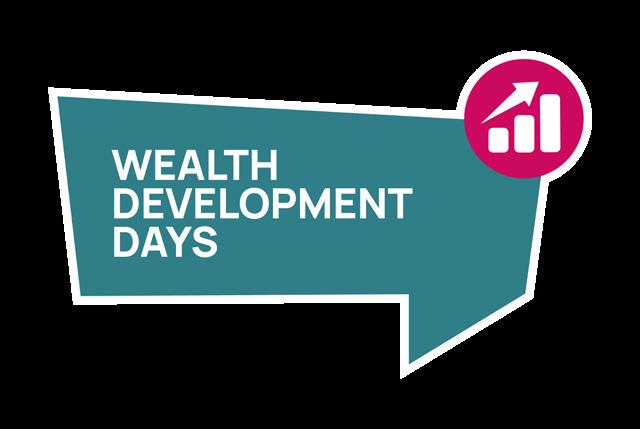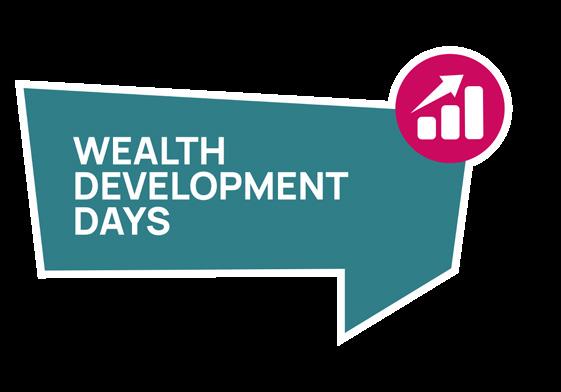
WALKING A MILE IN YOUR CLIENT’S SHOES


WALKING A MILE IN YOUR CLIENT’S SHOES
Most advisers aren’t held back by the reality of going DA—they’re held back by the myths surrounding it. So, let’s clear the air.
This phrase pops up in conversations, but do we grasp the depth of its message?
NINE MARKETING TIPS THAT WILL HELP GET YOUR BUSINESS NOTICED
Marketing is essential for influencing your audience, building trust, and boosting brand awareness.
DELIVERING PEACE OF MIND IN AN AGE OF UNCERTAINTY
In times like these, advisers earn client trust by remaining a calm, reassuring presence for clients bombarded by market noise.


CAS-74473-G4S4W6. This publication is issued by Bankhall Support Services Limited, a company registered in England and Wales with company number 2785381, whose registered office is at Aviva, Wellington Row, York YO90 1WR.
Bankhall is a trading style of Bankhall Support Services Limited a company registered in England and Wales with number 2785381 which is authorised and regulated by the Financial Conduct Authority under number 164877. Registered office: Registered office: Aviva, Wellington Row, York YO90 1WR. VAT number: 105437300. Bankhall® is a registered trademark of Sesame Bankhall Group Limited (a company registered in England and Wales with number 3573352. Registered office: as above). PMS is a trading name of Premier Mortgage Services Limited, which is an Appointed Representative of Bankhall Support Services Limited. Sesame Bankhall Group Limited is the parent company of both Bankhall Support Services Limited and Premier Mortgage Services Limited.
This document is for use by financial advisers only and is not approved for use with customers. The views expressed in this publication may be those of individual authors and do not necessarily reflect those of Sesame Bankhall Group Limited or any of its group of companies. Whilst every effort is made to ensure that contents of this publication are correct, we cannot guarantee complete accuracy and, to the maximum extent permitted by law, do


DIRECTOR
It’s hard to believe it’s already been six months since I joined the business. In that time, I’ve had the chance to meet many of you—at events, in meetings, and through the work we do together every day. What’s struck me most is the sheer commitment you bring to your clients. Whether it’s helping someone buy their first home, protecting a family’s future, or guiding a business through change, the work you do matters. And it’s been a privilege to support you.
This edition of Viewpoint lands at a time when there’s a lot happening across the market. But despite the noise, there’s also a lot to feel positive about. Our Mortgage & Protection Live series has been a real highlight—bringing advisers together to share ideas, build confidence, and connect with peers. The energy at these events has been fantastic, and the conversations have been refreshingly honest.
We’ve also had great engagement with our Wealth Development Days, which gave firms the chance to explore what’s happening in the wealth and protection space, and what’s coming down the track from a regulatory perspective.
And our Refinance Webinar landed at just the right time— helping advisers support clients through the current mortgage cycle with clarity and confidence. With 2026 expected to be even bigger in terms of mortgage cessations, it’s vital we act now to support clients effectively. If you haven’t yet explored our toolkits for Refinance and Protection, now’s the time. They’re designed to help you have better conversations and deliver better outcomes. If you're unsure where to start, please reach out to your Regional Account Manager—we’re here to help.
There are more events coming in H2, and I hope to see many of you there to keep the conversation going about the things that matter most to your clients.
We’ve also launched our new Exit Pathway proposition, led by David Wright. It’s designed to help firms plan for the future— whether that’s preparing for sale, succession, or simply building a more resilient business. It’s about giving you more choice and control over what comes next, and making sure you’re in the best possible position when the time is right.
On the regulatory front, there’s been a noticeable shift. Back in January, the FCA wrote to the Prime Minister and Chancellor to confirm they’d be taking a new approach—one that supports growth in the UK economy. Since then, we’ve seen two major policy papers published in the mortgage space, and they’re already starting to reshape the landscape.
The first, the Mortgage Rule Review, introduced several changes aimed at increasing flexibility. One of the most talked-about updates is the relaxation of rules around execution-only sales. The FCA has removed the ban on execution-only mortgage sales where there’s interactive dialogue—though advice is still required for more complex cases like debt consolidation and lifetime mortgages. Firms still need to record confirmation that customers understand what they’re opting out of, and importantly, you don’t have to adopt this approach if it doesn’t align with your standards. We believe advice matters and not all customers fully understand the risks of going it alone.
There’s also greater flexibility for reducing mortgage terms, with lenders no longer needing to carry out a full affordability assessment when a borrower wants to shorten their mortgage term. However, this is only applicable when the new term is more affordable than the current one or a product transfer—
so it’s not a blanket relaxation. It’s important to check how individual lenders are interpreting this.
And when it comes to remortgaging, the rules have been simplified to make it easier for customers to switch to a more affordable deal with a new lender—helping to rebalance the market after years of product transfer dominance.
The second paper, a discussion paper on the future of the mortgage market, explores ideas like using past rental payments as proof of affordability, supporting interest-only mortgages with more realistic repayment strategies, and improving access for vulnerable customers—including those affected by financial abuse. There’s also a focus on later life lending, with the FCA looking at how rules could evolve to support more innovative products and reflect the changing needs of older borrowers.
And importantly, the FCA is asking for feedback on how to improve customer understanding. They’re exploring whether certain types of advice—like debt consolidation—should come with enhanced standards, and whether the current rule requiring advisers to discount the cheapest mortgage is the best way to help clients understand suitability. These are open questions, and the FCA is inviting views before deciding what comes next.
At the same time, the digital landscape continues to evolve. AI, CRM systems, and back-office platforms are becoming more embedded—but it’s not just about having the tools. It’s about understanding how they work, where the data goes, and how they support good governance. The FCA’s “Dear CEO” letter made it clear: data is now central to how firms are supervised. Used well, it can drive better outcomes, stronger oversight, and smarter decisions.
We’re also seeing more focus on vulnerability—and rightly so. The FCA expects firms to recognise and respond to vulnerability in all its forms, whether that’s health, life events, resilience or capability. It’s not always obvious, and clients don’t always tell you. But by listening carefully, asking the right questions, and building flexibility into your advice process, you can make a real difference.
As someone who’s spent a lot of time thinking about how technology and regulation intersect, I believe we’re at a turning point. The firms that thrive will be those that treat compliance as a strategic advantage—not just a box to tick. That means embedding good outcomes into every part of your business, from systems and controls to client communications. It means being proactive, not reactive. And it means staying curious, open, and ready to adapt.
This edition of Viewpoint brings together insights on all of this and more—from navigating market volatility and supporting vulnerable clients, to making the most of digital tools and preparing for the future. It’s packed with practical ideas, expert views, and real-world examples to help you keep moving forward.
Thanks, as always, for everything you do. Whether you’re helping a first-time buyer, protecting a family, or planning your next business move, we’re here to support you every step of the way.

THINKING
AUTHORISED? LET'S CLEAR UP

Andy Staines New Business Consultant
Over the years, I’ve worked with hundreds of financial advisers— many of them appointed representatives (ARs)—who’ve asked the same question: “Should I become directly authorised?” It’s a big decision, and understandably, it comes with a lot of uncertainty.
What I’ve learned is that most advisers aren’t held back by the reality of going DA—they’re held back by the myths surrounding it. So, let’s clear the air. If you’re considering the move, here are 10 of the most common misconceptions I hear—and the truth behind them.
1. “I’ll still be treated like I’m part of a network.”
No—you won’t. As a DA, you’re no longer bound by network rules, restrictions, or commercial priorities that don’t align with your own. You gain the freedom to choose your own product providers, platforms, and processes. You decide how to run your business, how to serve your clients, and how to grow. It’s a shift from being part of someone else’s framework to building your own.
2. “It’s too difficult to go DA.”
It’s not. Yes, there’s a process—and yes, it requires preparation. But with the right guidance, it’s absolutely achievable. That’s why
we created Route to DA: a structured programme that helps you understand what’s required, prepare your application, and build the foundations for a successful DA firm. You don’t have to do it alone—and you shouldn’t.
3. “The FCA is trying to catch me out.”
This one comes up a lot—and it’s simply not true. The FCA’s role is to ensure firms deliver good outcomes for clients and operate responsibly. They’re not looking to trip you up—they’re looking to see that you understand your obligations. One of the most important roles in a DA firm is the compliance officer. Whether that’s you or someone you appoint, the FCA wants to know that person understands the rules, monitors the firm’s activities, and ensures regulatory standards are met. It’s about accountability, not punishment.
4. “I should do it to earn more money.”
Yes, becoming DA can improve your margins—but that shouldn’t be your only motivation. With greater financial reward comes greater responsibility. You’ll be accountable for compliance, risk management, and business operations. You may become a business owner, employer, and strategic decision-maker. If you’re ready for that, fantastic. But make sure your decision is based on long-term goals, not short-term gains.

5. “I’ll lose all my support.”
Not true. You’ll lose the network’s support—but you’ll gain the freedom to choose support that suits you. From compliance consultants to tech platforms, from paraplanning services to business development coaches—there’s a whole ecosystem out there. And many DAs find that the support they get is more responsive, more tailored, and more aligned with their business goals.
6. “I need to know everything before I start.”
You don’t. What you need is a mindset of learning and adaptability. No one expects you to be an expert in regulation, systems, or business strategy from day one. What matters is that you’re willing to ask questions, seek advice, and build a strong foundation. The most suitable partners will help you fill the gaps and grow your confidence over time.
7. “It’s all or nothing.”
Actually, there are ways to transition gradually. Some advisers start by exploring hybrid models or setting up a DA firm alongside their AR status. Others take a phased approach—building their business plan, securing support, and preparing their application over time. You don’t have to leap—you can step.
8. “I’ll have to spend all my time on compliance.”
Compliance is critical—but it doesn’t have to dominate your day. With the right systems, processes, and support, you can embed compliance into your business without it becoming a burden. Many DAs find that once they’ve built a strong framework, compliance becomes part of the rhythm—not a constant distraction.
9. “My clients will be worried if I leave the network.”
Most clients care about the quality of advice and service—not the regulatory structure behind it. In fact, many clients see DA status as a sign of independence, professionalism, and
commitment. With clear communication and reassurance, your clients will understand the change—and many will respect it.
10. “I’ll be on my own.”
You won’t. Becoming DA doesn’t mean becoming isolated. You’ll have access to a wide range of support services, communities, and professional networks. And if you choose the most suitable partners, you’ll have people by your side who understand your journey and are invested in your success.
So, is DA right for you?
Only you can answer that. But if you’re thinking about it, don’t let fear or misinformation hold you back. Becoming DA is a bold move—but it can also be the most empowering step you take in your career.
Explore our Route to DA programme and see how we can help you make the transition with confidence: bankhall.co.uk/Directly-Authorised
And remember—going DA doesn’t mean going it alone. At Sesame Bankhall Group, we’re more than just a launchpad. We’re a Proactive Partner for Life. From your first conversation to your first client as a DA—and every milestone beyond—we’re here to support you. Whether it’s connecting you with advisers who’ve successfully made the leap, offering tailored guidance, or helping you build a thriving business, our commitment doesn’t end when you go DA. It begins.



Nick Eatock Chief Executive Officer
The first half of 2025 has certainly lived up to any late-2024 predictions that “you ain’t seen nothing yet”. From President Trump’s on-again, off-again global trade tariffs and central banks’ indecision over inflation and interest rates, to intractable conflicts engulfing Ukraine, the Indian subcontinent and the Middle East and the resulting energy market shocks, it’s hard to get through a day without new headlines adding to the general sense of global upheaval.
In times like these, advisers earn client trust by remaining a calm, reassuring presence for clients bombarded by market noise. According to the lang cat’s 2025 Advice Gap research, a third of those who paid for financial advice in the last two years did so because it gave them peace of mind that they would have enough money in future. Periods of market turbulence are the perfect time to emphasise that investors should always focus on the long term in seeking future financial security and not react in panic to every market movement.
This customer-facing message is reinforced behind the scenes by firms efficiently taking care of the ongoing work of managing market uncertainty, including rebalancing portfolios, adjusting
plans to reflect clients’ evolving goals, and staying firmly on the right side of regulatory compliance.
With volatility likely to persist, technology has a vital role to play in maintaining client confidence.
For example, cashflow modelling provides a powerful opportunity to show clients how changing economic conditions might impact their finances. By taking into consideration a host of variable factors – assumed rates of inflation, interest rates, economic growth, taxation and the client’s risk tolerance and financial goals – advisers can use these models to vividly bring to life personalised projections of future wealth. Running different scenarios can help clients explore ‘what-ifs’ prompted by specific concerns in a structured and reassuring way.
Advisers and planners tell us that these tools are most effective when used interactively, sitting down with clients and walking through the different outcomes together. Visualising their

potential financial future helps clients understand and value the financial plan, leading to better decision making and enhancing the adviser-client relationship.
For those still building wealth, clear illustrations of the compounding effect of early, consistent investing on eventual returns can be a powerful motivator. It can also help dissuade clients from reducing their investment contributions, or cashing out, in response to short-term needs or fears.
For retired clients, cashflow planning in conjunction with analysis of essential and discretionary spending is crucial to assessing income sustainability. It can uncover where savings can be made, or whether a more comfortable lifestyle is achievable, and how different choices will impact the longevity of their capital. These fact-based conversations help determine whether desired income levels can be maintained, or if spending plans need to be adjusted.
Communicating with care
Another key consideration is how firms communicate with clients during ongoing market turbulence. Each firm will have its own approach but making sure all communications with clients pass the ‘trusted reassurance’ test is vital. This means ensuring that the business management system is robust enough to deliver the right messages to the right clients, including those identified as vulnerable.
As we look ahead to the second half of 2025, advisers will be watching closely for further central bank moves, potential escalation in geopolitical tensions, and continued market volatility. It’s hard to predict what will happen next, but one thing is clear: in this environment, the value of regulated advice, supported by smart technology, is more important than ever.
Using technology to stay close to clients come what may, can help calm fears, prevent costly knee-jerk decisions, and strengthen long-term relationships. Clients value the peace of mind that comes with paying for advice from calm professionals well-equipped to keep their plans on the right track, no matter what the world throws at them.

We transform the advisory experience.
Your advice can be life-changing – our technology makes it possible. Book a demo
Registered in England and Wales No. 5206315. Registered Address: Wellington House, 60-68 Wimbledon Hill Road, SW19 7PA.
When investing your capital is at risk. The Financial Conduct Authority does not regulate cashflow modelling.



Louise Apollonio Head of Corporate Accounts
It’s no secret the last few years have been turbulent for landlords. Soaring interest rates, rising inflation, and market uncertainty tested even the most seasoned investors. But change is in the air. With the Bank of England’s base rate now cut to 4.25%1 and optimism returning, landlords are starting to look ahead with renewed confidence.
It's a stark shift from the caution of previous years and a signal that the sector may be entering a new phase of growth.
Rental yields are on the rise too, hitting a high of 7.4% in Q1 20252. For many, this represents the perfect storm of opportunity: easing borrowing costs, steady tenant demand, and improving returns.
Growth is back on the agenda
That renewed confidence is translating into action. More than 70% of landlords are planning to grow their portfolios this year3, whether through single-unit purchases, portfolio expansion, or strategic remortgages. The appetite for investment is clear.
Regional buy-to-let markets are leading the way. New data shows landlords are increasingly shifting focus to the North East, North West, and Midlands, where property prices are lower and rental yields are higher. In fact, the North East currently sees the highest landlord purchase activity in the UK, with nearly 28% of all home sales in some areas going to investors4
High-yield cities such as Manchester, Sunderland, Leeds, and Nottingham have become standout choices, offering yields of between 6.5% and 8.5% alongside strong tenant demand and regeneration potential5. If your clients are looking for new investment opportunities, these regions offer a compelling balance of affordability, demand, and long-term growth potential.
Alongside this regional shift, more landlords are turning to limited company structures as part of their growth strategy. A record 50,000 buy-to-let companies were formed in 2024, with over 300,000 now active in the UK6. This approach offers tax efficiencies and greater flexibility, especially for portfolio investors. Brokers who can advise on SPVs, intercompany lending, and specialist BTL criteria will be well-placed to add real value.
After months of speculation, the Bank of England cut its base rate to 4.25% in May 2025, the first reduction since 2023. With more cuts expected later in the year, the tide may finally be turning on borrowing costs.
For landlords, this brings welcome relief. Lower mortgage expenses combined with strong rental returns make 2025 an ideal time to revisit investment plans. Brokers are already reporting increased conversations with landlords eager to act.
However, affordability still poses a challenge. Despite lower base rates, most lenders are stress-testing rental coverage at upwards of 5%, with income coverage ratios (ICRs) between 125–145%7 Brokers can play a key role by helping clients structure deals using longer fixed rates, top-slicing options, or interest-only arrangements. Understanding lender flexibility here can make the difference between a deal working or not.
With the Buy-to-let market heating up this summer, we’re here to help brokers and their clients make the most of the market. Whether it’s expanding a portfolio, navigating complex cases, or securing a competitive remortgage, our Buy-to-Let solutions are designed for the real world.
Another area brokers shouldn’t overlook is the increasing focus on energy efficiency. While the government has delayed mandatory EPC upgrades, many lenders now offer preferential rates for EPC A–C properties8. As energy bills continue to influence tenant decisions, helping landlords future-proof their investments through green improvements and relevant mortgage products is fast becoming best practice.
With our expertise and dedication to securing mortgages that work for each individual, TML is ready to help brokers deliver results in a market full of potential.
Your property may be repossessed if you do not keep up repayments on your mortgage. The Financial Conduct Authority does not regulate some aspects of buy to let mortgages.
The Mortgage Lender Limited is authorised and regulated by the Financial Conduct Authority (Financial Services Firm Reference Number 707058). Our Buy to Let mortgages are not regulated by the Financial Conduct Authority. Registered in England & Wales as company number 9280057. Registered office address: Lutea House, Warley Hill Business Park, The Drive, Great Warley, Brentwood, Essex, CM13 3BE.
1 https://www.thetimes.co.uk/article/live-latest-news-uk-companies-ftse-100shares-sbkc97xkq
2 Q1 2025 Rental Barometer
3 Landlord Sentiment Survey 2025 by Lendlord
4 Revealed: Top UK buy-to-let hotspots as purchases surge in the north | MoneyWeek
5 What is a good rental yield in the UK – Guide for 2025 - Wise
6 Buy-to-let boom: Landlord-owned companies now dominate UK business registrations | News
7 Buy to Let Rental Stress Tests • The Buy to Let Broker
8 Tax survey of landlords suggest two thirds planning a sale - Landlord Today

Our experts are ready to help with your tricky mortgage cases.
Speak to your BDM and see what we can do.

Whether you’re looking to sharpen your skills, stay ahead of market trends, or simply connect with like-minded professionals, our events are designed to help you do just that. From practical learning to strategic insight, there’s something for everyone - and every business.
If you haven’t yet attended one of our Mortgage & Protection Live events, now’s the time. These sessions bring together expert speakers, product providers and fellow advisers to explore the latest developments in the mortgage and protection markets. It’s a chance to hear what’s new, ask questions, and leave with ideas you can put into action straight away. Our Wealth Development Days are also proving incredibly popular. These events dive deeper into the evolving wealth and protection landscape, with a strong focus on regulatory updates, client vulnerability, and future planning. If you want to understand what’s coming next - and how to prepare - these are not to be missed.
But that’s not all. Our Virtual Learning sessions offer focused learning in areas like investments and pensions, while our Skills Workshops are designed to support those in leadership roles with practical tools and insights. We also run Lunch & Learns, helping advisers build confidence and deliver compliant, client-focused advice.
Whether you prefer in-person networking or virtual learning from the comfort of your desk, our blended programme means you can choose the format that works best for you.
Explore all our upcoming events and register here:









Richard Waters Head of Protection Distribution HSBC Life (UK)
How much is too much when it comes to contacting your clients? You know your clients best, but to support you we’ve collated a few ideas for contact opportunities over the next few months.
1. Busy season for moving house (September-November1)
After the summer holidays, there’s usually an increased interest in home buying. Some people will have used their break to think about what comes next in their property journey. For others, September can signal the urge to find a new house and be settled before Christmas.
Mortgage application
Every mortgage application can provide the opportunity to look at a client’s financial situation as a whole. Ensuring good outcomes is not just about finding the most suitable mortgage, but helping to make sure homebuyers and their dependents will be able to continue their payments and stay in their home should one of them become ill or die.
Mortgage exchange and completion
The run up to mortgage exchange and completion may be a good chance to check that any life or critical illness cover discussed is still the most appropriate fit. House-buying can be a long process, and things could change along the way.
You could also help make sure cover starts at the right moment – when contracts are exchanged the buyer becomes legally responsible. HSBC Life (UK)’s Life Insurance policy offers 90day free protection – which can protect your clients between exchange and completion.
Product maturity
Keeping an eye out for insight like the CACI Mortgage Market Database and UK Finance fixed rate mortgage data could help you spot the peaks in product maturities. This could be a good time for you to reach out to your clients, for example to see if you could secure them a more suitable mortgage deal than they could get with their existing lender, and to reassess their financial wellbeing and protection cover.

2. Life milestones
New baby
August, September and October2 typically have the highest birth rates in the year according to government stats. New parents often have so much to think about, they may welcome a reminder to consider a protection plan for the new shape of their family. At HSBC Life (UK) clients can also increase their Sum Assured without further medical underwriting within three months of the birth of a child.
Separation or divorce
If people are separating, their joint policies may need to be split into individual ones, or one person may want to take over the whole policy. There are also conversations to be had about whether beneficiaries will change and if people’s protection needs updating due to any new financial responsibilities. At HSBC Life (UK) we offer a Separation Benefit where in the event that your clients have a joint policy and they separate, the policy can be split into two single policies without the need for further medical information.
Teens off to university
September sees the start of the university year. For clients with HSBC Life (UK) protection policies, it could be a good moment to remind them of the Online Health Services available to dependent children aged 16-23.3 Parents experiencing empty nest syndrome might also welcome the chance to talk. Up to 8 mental health consultations are available to be shared between family members every year.3
3. Reminders during client catch-ups
Online Health Service reminders
If you’re catching up with your clients, reminding them about the non-contractual HSBC Life (UK) Online Health Services3 is a good way for them to understand the everyday value of the policy. For new policyholders it might be useful to jog their memory to sign up for the HSBC Health app3 if they haven’t already. HSBC Life (UK) analysis in April 2025 indicates that once registered with the HSBC Health app, clients are 43% less likely to lapse their policy on average – good news for advisers too.
If you have any questions about our products or you need support with your agency setup, our Protection Adviser Support Team is always happy to help. You can email protectionteam@hsbc.com or call 0345 587 3877.
HSBC Life (UK) Limited is authorised by the Prudential Regulation Authority and regulated by the Financial Conduct Authority and the Prudential Regulation Authority. Our Financial Services Register number is 133435 and our registered office is at: 8 Canada Square, London E14 5HQ. Registered in England number 00088695. HSBC Life (UK) Limited is a member of the Association of British Insurers.
1 https://www.gov.uk/government/statistics/monthly-property-transactionscompleted-in-the-uk-with-value-40000-or-above
2 https://www.ons.gov.uk/peoplepopulationandcommunity/ birthsdeathsandmarriages/livebirths/datasets/birthsummarytables
3 HSBC Life Online Health Services do not form part of your client's insurance policy and HSBC Life have the right to change or remove these additional health services at any time. Such a decision will not affect your client's insurance cover with HSBC Life in any way.



Marcus Primhak National Account Manager
Have you ever stopped to think about what it means to “walk a mile in someone else’s shoes?”
This phrase pops up in conversations, but do we grasp the depth of its message? It’s more than just a suggestion to consider someone else’s life. It’s about empathy, understanding, and stepping into another person’s world.
However, do we think about the financial and emotional pressures during a client’s time of need?
Like me, if you work within the Protection industry you will speak about the different products available to meet customers’ needs on a regular basis. How do we react when we hear about someone who is off work due to illness and as a result has lost their monthly income?
Our initial reaction will often be…I hope they have Income Protection in place. Replacing most of their lost Income is undoubtably the key area of need.
Walking in someone’s shoes
At the start I mentioned putting yourself in someone else’s shoes.
Let’s look at an example, based on one of our Income Protection claims we had at LV=.
You work full time, you’re married and have one daughter. Out of the blue you suffer a stroke and are left with limited movement in your arms and your speech has been badly impacted. The good news is you have Income Protection, however that won’t provide any monthly benefit until the 3-month deferred period has run its course.
In these 3 months your husband needs to go back to work as the household can’t afford for him to be off work to look after you. The thought of receiving your IP benefit at some point soon is 100% better than not. However, all you want is life to get back to normal, or as close to it as possible.
What if your IP plan gave you access to immediate support, financially and emotionally?
Imagine being in the above position and also having access to:
• One-to-one support and guidance from a dedicated claims handler.

• Immediate back to work support (as early as during the deferred period) to help you get back to work quicker. Arranged and paid for by your protection provider.
• 24/7 access to a remote GP and mental health support throughout your recovery and for as long as your policy is live.
For many, a successful Income Protection claim isn’t just about the tax-free income they will receive after their deferred period. It’s the additional support they have access to - before, during and after the claim begins.
beyond the standard Income Protection claim
When thinking of your clients’ circumstances, always pull out the Income Protection features that do and could benefit them in the future.
You are a parent with a daughter, and she is sadly diagnosed with Non-Hodgkin lymphoma. You want to take the time off to support your daughter and be there throughout her treatment. When speaking to your financial adviser, they remind you that your Income Protection policy includes parent and child cover.
This cover pays a lump sum out to parents if their child is diagnosed with a listed illness. After receiving medical evidence to confirm the diagnosis, you receive a payment of £25,000 for the family. This payment allows you and your partner to focus on what's most important – spending time together as a family.
Pay my mortgage
Imagine you are a new homeowner, and you have a mortgage of £250,000. Unfortunately, not long after signing up for your IP,
you suffer a haemorrhage which eventually leads to an epilepsy diagnosis with chronic symptoms that leave you unable to go back to work as a caterer.
When submitting your claim, your adviser notices you receive Universal Credit and reminds you that as part of your policy, you can use the pay my mortgage facility. This facility allows you to have all or some of your monthly Income Protection paid directly to your lender while protecting some or all of your Universal Credit income at the same time.
Now that you have walked in a few client’s shoes, you can make the most of your protection conversations by using this experience with your clients. Within LV’s Income Protection policy alone, we offer 4 potential claim opportunities through the various product features included.
To find out more, contact your LV= account manager
All situations are based on claims received by LV=.
Liverpool Victoria Financial Services Limited: County Gates, Bournemouth BH1 2NF.
LV= and Liverpool Victoria are registered trademarks of Liverpool Victoria Financial Services Limited and LV= and LV= Liverpool Victoria are trading styles of the Liverpool Victoria group of companies. Liverpool Victoria Financial Services Limited, registered in England with registration number 12383237 is authorised by the Prudential Regulation Authority and regulated by the Financial Conduct Authority and the Prudential Regulation Authority, register number 110035. Registered address: County Gates, Bournemouth, BH1 2NF.


Q: Claire, you’ve been with Sesame Bankhall Group (SBG) for six months now—how’s the journey been so far?
It’s been fantastic. I’ve loved getting to know our advisers and teams across PMS and Bankhall. There’s a real sense of purpose here, and I’ve felt that from day one. The ambition is clear, and the opportunity to make a difference is huge.
Q: What does your role involve day to day?
I lead both PMS and Bankhall, which means I’m effectively running two businesses that support our clients across the full spectrum—from engagement and events to client experience. It’s full-on, but incredibly rewarding to lead two such amazing brands. Day to day, I’m responsible for supporting our existing members, growing adviser numbers, and helping to ensure our proposition is appropriate—both commercially and practically. That includes everything from protection and wealth consultancy to compliance and tech. I also work closely with Aviva and our wider group to align strategies and help drive the market forward.
Q: You’ve spoken a lot about your passion for technology and data. Where does that come from?
It’s been a personal journey. Seven years ago, I was diagnosed with a spinal cord tumour. The radiotherapy I received used cutting-edge tech to create a 3D profile of the tumour. That technology saved my life. Since then, I’ve supported clinical trials at Imperial College London, helping design data-led innovations in healthcare. So yes, I’m passionate about tech—but not just because it’s clever. Because it can change lives.
Q: How does that experience shape your approach to propositions?
It’s made me really value clarity, purpose and impact. When we build propositions, I want them to be meaningful—not just shiny. That means listening to advisers, understanding what they need, and making sure our offer helps them deliver great outcomes for their clients. Whether it’s simplifying processes, improving sourcing, or supporting compliance, it has to work in the real world.
Q: What’s your approach to listening to advisers?
It’s simple: ask, listen, act. I spend a lot of time talking to advisers—at events, on calls, and through our account managers. I want to know what’s working, what’s not, and where we can improve. That feedback shapes everything we do. It’s not just about building propositions—it’s about co-creating them with the people who use them every day.
Q: What excites you most about the future of advice?
The potential to do things differently. We’re seeing huge shifts in regulation, digital capability, and customer expectations. But at the heart of it all is the adviser-client relationship. I believe intermediaries are central to the future of financial services— not just to help people access advice, but to build sustainable businesses. That’s why I’m so focused on growth, development, and making sure our firms feel supported.
Q: You spent over 20 years at Lloyds before joining SBG. What made you take the leap?
I was very happy at Lloyds, and I learned a lot there—especially in my last role leading Strategic Relationships. But when I met Richard Harrison and the Executive team here at SBG, I was struck by their vision and values. The “Proactive Partner for Life” positioning really resonated with me. It’s not just a strapline—it’s a mindset. And I wanted to be part of it.
Q: What’s something people might not know about you?
I’m neurodivergent, and that’s something I’ve only recently started talking about more openly. It helps me understand my limits and manage my energy, which is so important in a fastpaced role. I also love crafting—anything creative really—and I’m always up for a dance. If there’s music, I’m in!
Q: What’s your message to advisers reading this?
Firstly, thank you. The work you do is so important, and we’re here to support you. Secondly, don’t be afraid to challenge the status quo. Whether it’s trying new tech, exploring new markets, or thinking differently about your business model—there’s never been a better time to be bold. And finally, if you see me around, come say hello. I love a chat!

Exit your business with confidence - and clarity
As a Financial Planner, you’ve spent years building trusted relationships and delivering value to your clients. Now, as you consider selling your business, you want to ensure you're fully prepared - ready to maximise its value, find the most suitable buyer, and navigate the complexities of the sales process with confidence.
But selling a business isn’t just about the numbers. It’s about protecting your legacy, your clients, and your team. That’s why a tailored, values-led approach matters.
That’s where we come in
We take the time to understand what makes your business unique - your goals, your client relationships, and your service proposition. Then we match you with potential buyers who share your values and vision, helping to ensure a smooth transition that benefits everyone involved.
Let’s talk
For a free, confidential discussion, contact exitpathway@sbg.co.uk or visit exitpathway.sbg.co.uk for more information.



Darren Arulvasagam Strategic Account Manager, Legal & General Home Finance
Few of us want to be labelled ‘vulnerable’. Which is why, over 76% of vulnerable adults don’t see themselves like this. And yet, the FCA estimates over 50% of adults are
In the last few years, we’ve seen some increasing, and arguably much needed, focus on this – especially since Consumer Duty. During a recent chat on our Just Covered podcast, Robin Melley from The Financial Vulnerability Taskforce noted that even today he, “still meets advisers who say, ‘I don’t deal with vulnerable customers’”. His question back is, “do you only deal with healthy people?”. It’s unlikely.
Almost everyone’s vulnerable at some point in their lives. It’s a far broader and more nuanced spectrum than, at first glance, many might think.
So, how do we recognise it? And as an industry, how can we improve our conversations to support better long-term outcomes for those clients?
Understanding is key
The FCA defines vulnerability as “someone who, due to their personal circumstances, is especially susceptible to detriment, particularly when a firm is not acting with appropriate levels of care”. This might make them unable to deal with their finances effectively or more likely targets of fraud and abuse.
Broadly speaking, four triggers can create these circumstances:
• Health: Perhaps the easiest to recognise – mental or physical events can cause temporary or long-term vulnerability.
• Life events: A divorce, job and income loss or bereavement can make someone vulnerable.
• Resilience: More than just financial ability to cope with unexpected circumstances, it’s also the mental and emotional to adapt to challenges or traumas.
• Capability: Some factors, often beyond control, can limit ability to get better outcomes ¬– like education, financial knowledge, digital literacy, experience, language barriers, and learning difficulties.
Customers can belong to multiple categories simultaneously and may be either permanent or temporary.
Approaching conversations with care
Naturally, many clients aren’t open about these circumstances. Some aren’t even fully aware themselves. Listening carefully, looking out for subtle cues, knowing the right questions to ask will help pick up on them.

Conversations should be treated with sensitivity, understanding and flexibility. Most importantly, take thorough care at each stage that the situation isn’t worsened by your advice or actions.
In line with FCA guidance and Consumer Duty, the aim is to create outcomes at the same quality of someone without vulnerability triggers. As advisers, we should all be doing our bit to improve outcomes across the board.
Our advice to firms is to start thinking about what each section of the FCA guidance means to them. Here are some initial steps you can take to embed best practice into everyday operations:
• Upskill: All frontline staff must be appropriately trained and given practical and emotional support.
• Review products and services: Consider the effects of products and services on vulnerable customers at every level.
• Improve customer service: Systems should be in place for vulnerable customers to disclose their needs. This means offering access to specialist support or third-party representation and handling sensitive information with care.
• Monitor and evaluate: Regular assessments are essential to keep improving outcomes with an understand of what a good outcome likes like and monitoring it, including continuous practice and outcome reviews to ensure FCA standards are met.
• Assess communications: Make sure all information about products and services is easily understandable, like avoiding jargon and gained client feedback to ensure understanding. Offer a choice of communications channels that consider the potential needs of vulnerable customers. If necessary, record conversations and follow up in writing for additional support.
fairer, better future for everyone
Vulnerability needs to be part of business as usual if we’re all going to level up as an industry. The benefits will be enormous. Not just for customers, but for improving public trust and confidence in our profession too.
Also, be sure to catch up on our vulnerability-focused, Just Covered podcast with Robin Melley of the Financial Vulnerability Taskforce.
Remember, you can tell us about your client vulnerabilities when applying for any of our Lifetime Mortgages so that we can appropriately serve our mutual customers.
For further reading, I recommend these valuable resources:
• https://consumerduty.org/about/about-the-fvt
• Guidance for firms on the fair treatment of vulnerable customers | FCA
• Treating vulnerable consumers fairly | FCA
A lifetime mortgage is a loan secured against your client’s home that is usually repaid when your client dies or moves out of their home into long term care. Unpaid Interest is added to the loan amount each month, meaning we charge interest on the loan plus any interest already added. The amount owed will increase quickly over time. There may be cheaper ways to borrow money. Repaying the loan early is likely to cause a significant early repayment charge. A lifetime mortgage will reduce any inheritance. If your client gifts money away, the recipient may have to pay inheritance tax in the future. A lifetime mortgage could affect any entitlement to means-tested state benefits. As a last resort, your client’s home may be repossessed if they do not keep up with any mandatory interest payments.
Legal & General Assurance Society Limited. Registered in England and Wales No. 00166055. Registered office: One Coleman Street, London, EC2R 5AA.
Legal & General Home Finance Limited is a wholly owned subsidiary of Legal & General Group plc. Registered in England and Wales number 04896447.
Registered office: One Coleman Street, London EC2R 5AA. Legal & General Home Finance Limited is authorised and regulated by the Financial Conduct Authority.



Karla McNeilage Marketing Expert & Founder of Wave Socials
Marketing is essential for influencing your audience, building trust, and boosting brand awareness. While social media is powerful, there are many other ways to elevate your business. Here are nine expert tips to help you stand out:
1. Start with strategy
A strong marketing strategy is your roadmap to success. Think of it as your guide for differentiating yourself from competitors, knowing who to target and how to talk about your business.
Determine your target audience through buyer personas, analyse your competitors, set goals and create purposeful content.
You can use Virgin Money’s M Track dashboard to give a real time view of social media and marketing analytics, all in one place
2. Bold branding
Stand out! Make your branding bold and authentic. Remain true to your brand values and goals and you will attract a loyal and aligned audience. Check out Virgin StartUp – a great guide to help you stand out from the crowd!
3. Content that converts
Effective content taps into emotions like belonging and empathy. Emotional decision-making drives consumer behaviour, so use surveys and polls to understand your audience. Create “thumbstopping” content—like eye-catching billboards or social ads; ones that grab attention and inspires action.

4. Build your community
An engaged online community is invaluable. Be authentic and interact with your audience through comments, DMs, and giveaways. The stronger your connection, the more loyal your followers will be.
5. Listen and learn
Once you know your customers and target audience inside out, you can create purpose-driven content and campaigns that they will resonate with and enjoy.
Stay on top of marketing trends and create campaigns that align with your brand and business goals.
6. Get your emails opened
Emails must offer value and solve problems for your subscribers. Ask yourself: What’s in it for them? Test different formats to see what works best. Keep your content relevant and engaging to boost open rates.
7. Write copy that sells
Great sales copy tells a story and evokes emotion. Focus on benefits, not just features – think of Apple’s “1,000 songs in your pocket.” Make your copy easy to understand and visualise to drive action.
8. Influence with influencers
Partner with influencers who align with your brand. Their credibility and connection with your audience can boost your reach and conversions. Let them share content in their own voice for maximum impact.
9. Build your online presence
Your website is your business’s digital storefront – your 24/7 salesperson & opportunity to leave a lasting impression.
Track website traffic and develop a more comprehensive understanding of customer behaviours, software such as Adobe Customer Journey Analytics and Google Analytics are effective.
Remember, you don’t need to master all nine tips at once. Whether it’s branding, community management, or influencer strategy, there are plenty of experts and agencies ready to help.
Follow Karla on LinkedIn for more marketing hacks.
Clydesdale Bank PLC (trading as Virgin Money). Registered in Scotland (Company No. SC001111). Registered Office: 177 Bothwell Street, Glasgow G2 7ER. Authorised by the Prudential Regulation Authority and regulated by the Financial Conduct Authority and the Prudential Regulation Authority.


Rebecca Luter People & Corporate Communications Director
In the world of financial advice, complexity is a constant. Advisers are expected to navigate shifting client needs, evolving regulatory landscapes, and the demands of team leadership—all while maintaining personal effectiveness. In such an environment, the ability to prioritise is not a luxury; it is a necessity. It is the difference between leading with purpose and simply reacting to the noise.
Prioritisation is often misunderstood as a tactical exercise in time management. In reality, it is a strategic capability—one that enables leaders to align their decisions with long-term goals, allocate resources intelligently, and foster a culture of focus and accountability. It is the foundation of high performance.
Organisational research has long highlighted the link between decision-making and business outcomes. Bain & Company found that companies with leaders who make decisions swiftly and confidently outperform their peers by up to 20%. This is particularly relevant in financial services, where advisers must balance immediacy with strategic foresight. The ability to discern what truly matters—and act on it—is a hallmark of effective leadership.
Cognitive science offers further insight. Decision fatigue, a concept explored by Roy Baumeister and others, shows how the accumulation of small, low-value decisions can erode mental clarity and reduce the quality of judgment. Advisers who fail to prioritise risk becoming overwhelmed, reactive, and ultimately less effective. Conversely, those who structure their day around
high-impact work protect their cognitive bandwidth and lead with greater intention.
Frameworks such as the Eisenhower Matrix provide a practical lens through which to view this challenge. By categorising tasks according to urgency and importance, advisers can move beyond instinctive responses and make deliberate choices. This approach not only improves personal productivity but also enhances delegation. When leaders are clear about what matters, they empower their teams to take ownership of what doesn’t.
Tasks with clear deadlines and significant consequences if not completed in a timely fashion.
Tasks that need to get done, but you don't need your expertise in order to be completed.
Tasks with no set deadline but that bring you closer to your long-term goals.
Delete
Tasks that distract you from your preferred course, and don't add any measurable value.

Time-blocking is another technique that has gained traction in leadership circles. Rooted in the principles of behavioural design, it involves scheduling specific periods for focused work, thereby reducing the fragmentation caused by meetings, emails, and interruptions. It is a method that supports deep work—a concept popularised by Cal Newport—which is essential for strategic thinking and client planning.
Yet prioritisation is not merely a matter of tools and techniques. It is a reflection of values. What a leader chooses to prioritise signals what they believe to be important. This signalling effect shapes team culture, influences morale, and drives alignment. Leaders who consistently prioritise development conversations, strategic planning, or client engagement send a clear message about what success looks like.
The challenge, of course, lies in competing demands. Advisers frequently encounter situations where multiple tasks appear equally critical. In these moments, the ability to pause, assess impact, and make trade-offs becomes vital. Models such as RICE—evaluating Reach, Impact, Confidence, and Effort—offer a structured way to navigate these decisions. They help leaders move beyond intuition and toward evidence-based prioritisation.
skill. This involves asking the right questions—What outcome are we trying to achieve? What happens if we don’t do this now?— and being transparent about the cost of distraction.
Ultimately, prioritisation is a mindset. It is the belief that not everything can be done, and that not everything should be. It is the discipline to focus on the “rocks”—the things that truly matter—before the “sand” fills the jar. This metaphor, often used in leadership development, reminds us that time is finite, and that meaningful work requires intentionality.
For financial advisers, this mindset is transformative. It enables them to lead with clarity, support their teams with confidence, and deliver value to clients in a way that is both strategic and sustainable. In a sector defined by complexity, prioritisation is not just a skill—it is a source of competitive advantage.
Prioritisation is not a one-time decision—it is a daily discipline. It demands clarity, courage, and consistency. In leadership, it is often the quiet force behind the most impactful outcomes. Advisers who embrace this discipline find themselves not only more productive, but more purposeful. They become the kind of leaders who inspire trust, foster autonomy, and drive meaningful progress.
What makes prioritisation powerful is its simplicity. It asks a fundamental question: What matters most right now? And it challenges us to act accordingly. In practice, this means choosing to invest time in strategic thinking when the inbox is full. It means protecting space for team development even when deadlines loom. It means saying “no” not out of resistance, but out of respect—for the work, for the team, and for the goals that truly matter.
Saying “no” is often the most difficult part of this process. It requires not only clarity but courage. In organisations where everything is labelled “important,” the ability to challenge assumptions and guide stakeholders toward focus is a critical
There is a quiet confidence that comes from knowing your priorities and living by them. It enables advisers to lead with clarity in moments of complexity, and to model the kind of focus that builds resilient, high-performing teams. In a profession where the stakes are high and the pace relentless, this clarity is not just helpful—it is transformative.

9 September 2025 Northern Ireland
11 September 2025 Scotland
16 September 2025 Southampton 17 September 2025 Surrey
23 September 2025 Wales
25 September 2025 North London
30 September 2025 Manchester
1 October 2025 Wetherby 2 October 2025 Midlands
Mortgage & Protection Live will give you access to the latest insights and developments in the market, giving you the opportunity to develop the services you offer, and ultimately help you to improve outcomes for your customers. Save my seat
my seat
my seat Save my seat